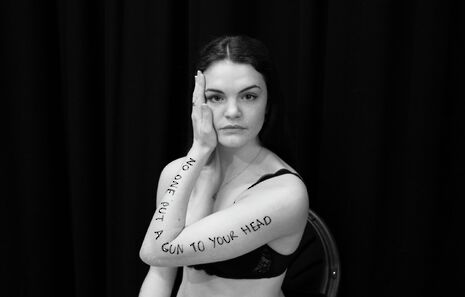Boys Will Be Boys preview: ‘not comfortable in the slightest’
Matilda Wickham’s production brings a claustrophobic examination of toxic masculinity to the ADC Theatre

Combining bankers and cabaret, an all-female cast is set to take on the male-dominated world of city trading in a production of Melissa Bubnic’s Boys Will be Boys. The play satirises a world where sex is wielded as a weapon, drawing attention to the hyper-masculine, often brutal, environment of the trading floor. Juxtaposing discussion of dark themes with performances of cabaret classics “specifically intended to jar with how horrible the content of the play is”, this production will insist on keeping the audience unsettled.
The protagonist, anti-heroine Astrid Wentworth (Georgia Vyvyan), sees the word “girlish” as something that should inspire shame and has risen to the top of her field through playing “a boy’s game” – desperately maintaining a performance of toxic masculinity in order to achieve success. Hiring young Priya Sengupta (Jai Shende), Astrid aims to pass on her tactics, inducing an exploration of the ways in which women struggle to navigate the complex dynamics of sex and power in a “man’s world”.
Described by Assistant Director Hannah Shury-Smith as “claustrophobic” and “not comfortable in the slightest”, this production of Boys Will Be Boys intends to prompt audience members to deeply question their actions and expectations. She promises that the audience will be entertained, though simultaneously challenged.
According to Director Matilda Wickham, the play is, above all, honest. Wickham hesitates to use the word ‘feminist’ when discussing the play, arguing that – although feminist readings are possible – “it’s just a story about what people do to survive”. During the rehearsal, both the directors and I admitted our feelings of discomfort when all-too-familiar scenes were depicted.
Created in collaboration with Cambridge University Pole Society (CUPS), dancing and physical theatre will be central to the performance. Wickham emphasises that the production is “very much a collaborative effort”, telling me that even they cannot say for certain what the atmosphere of the play will be, since each member of the cast has unique ideas to contribute and “different people will tell different stories through their movement”.
This production marks Matilda Wickham’s directorial debut, following extensive experience as an actor. Asked about the choice of play, they replied that Bubnic’s Boys Will Be Boys “has given me words to articulate things that I felt powerless in the face of” and expressed a desire to share that “feeling of power” with a new audience. Wickham also expressed their fascination with “the instincts the play brings out in people”, describing the seemingly contradictory allure of the dark environment depicted.
Wickham praised leading actor Georgia Vyvyan’s portrayal of Astrid, saying “it’s important to approach the ‘bad’ characters with as much empathy, understanding and humanity as possible”. Cautioning against the dangerous tendency to label certain groups of people and traits, they argued that by categorising things in such an un-nuanced manner, we are prevented from “interrogating our own behaviour” and “holding others accountable for their actions”. The expression ‘boys will be boys’ may be the title of this play, but it is certainly not a message the crew intend to convey.
Hannah Shury-Smith spoke of the emotional intensity of the rehearsal period due to the “often harrowing” aspects of the plot, and said that performing material of this kind enables strong relationships between cast and crew members to develop quickly, which was very evident in the rehearsal I attended. Just as the cabaret performances in the play aim to provide much needed relief to audience members, the actors must be able to enjoy themselves backstage in order to cope with the relentless exploration of difficult, sometimes painful, issues.
Although it is necessary to combat misogyny and violence constantly, this production seems particularly timely given the toxic attitudes and behaviours recently highlighted in the theatre and arts scene, following accusations of sexual abuse against several high-profile men in the industry.
Hannah Shury-Smith told me she applied for her role of Assistant Director shortly after the Harvey Weinstein allegations became public, saying “politically, this play is so important to be putting on right now”. She spoke of the power theatre has “to change perceptions”, and particularly noted the necessity of showcasing the struggles faced by certain groups in society so as to precisely pinpoint and combat them.
Boys Will Be Boys promises to provoke discussion of issues which are now, as ever, of utmost importance. The performances next week will try both to entertain and to provoke the audience, with cast members having worked hard to spread feelings both of intimacy and urgency throughout the performance.
Boys Will Be Boys is on at the ADC Theatre 21-23 February
 News / Christ’s announces toned-down ‘soirée’ in place of May Ball3 February 2026
News / Christ’s announces toned-down ‘soirée’ in place of May Ball3 February 2026 News / Right-wing billionaire Peter Thiel gives ‘antichrist’ lecture in Cambridge6 February 2026
News / Right-wing billionaire Peter Thiel gives ‘antichrist’ lecture in Cambridge6 February 2026 News / John’s duped into £10m overspend6 February 2026
News / John’s duped into £10m overspend6 February 2026 News / Epstein contacted Cambridge academics about research funding6 February 2026
News / Epstein contacted Cambridge academics about research funding6 February 2026 News / Corpus FemSoc no longer named after man6 February 2026
News / Corpus FemSoc no longer named after man6 February 2026










